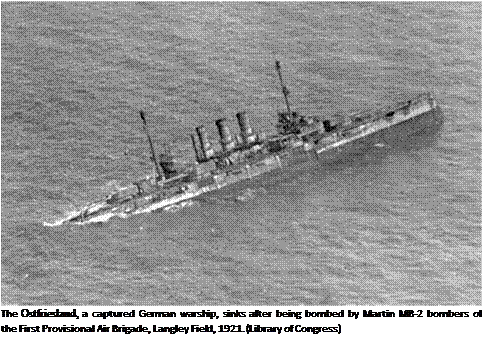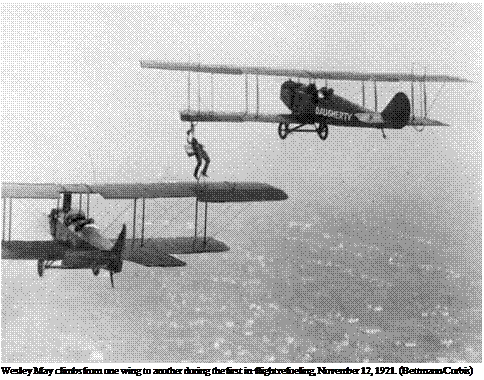1921
JANUARY 10 At McCook Field, Dayton, Ohio, engineers test an experimental, 700-horsepower engine, which boasts three banks of six cylinders.
February 21—24 At Rockwell Field, California, Lieutenant William D. Conley stages a solo transcontinental flight to Jacksonville, Florida, covering 2,180 miles in 22 hours and 27 minutes of flying time.
MARCH 23 At Chanute Field, Illinois, Lieutenant A. G. Hamilton parachutes from 23,700 feet and survives.
June 8 At McCook Field, Ohio, a DH-9 bomber flown by Lieutenant Harold R. Harris conducts the first experiments with a pressurized cabin.
July 13—21 Off Hampton Roads,
Virginia, aerial avatar General William “Billy” Mitchell, Army Air Service, effectively displays air power by sinking the captured German battleship Ostfriesland with
Martin MB-2 bombers. He also proclaims, somewhat prematurely, that the eclipse of capital ships is at hand and the supremacy ofair power beckons.
July 29 General William Mitchell leads a
dozen Martin MB-2 bombers over New York City to demonstrate its vulnerability to air attack. He hopes to convince political authorities that the Navy can no longer defend America’s coastline, and that that mission is best entrusted to the Air Service.
AUGUST In Ohio, the Orenco D-1, the first U. S.-designed American fighter craft, is jointly manufactured by the Ordnance Engineering Corporation and Curtiss. The D-1 achieves production status but is only manufactured in small quantities.
 |
AUGUST 1 The Bureau of Ordnance tests a gyroscopic-stabilized, World War I-type high-level bombsight designed by Carl L. Norden; this is a precursor to the famous Norden bombsight of World War II.
AUGUST 3—4 At Troy, Ohio, a modified JN-6 Jenny flown by Lieutenant John A. Macready performs the first crop-dusting mission against caterpillar-infested trees.
September 13 A private report written by Brigadier General William “Billy” Mitchell for Chief of the Air Service Major General Charles T. Menoher, which unequivocally calls for an aviation branch within the Department of National Defense, somehow leaks its way to the press.
SEPTEMBER 23 In Chesapeake Bay, Virginia, Air Service bombers send the obsolete battleship Alabama to the bottom with a 2,000-pound bomb.
September 28 At McCook Field, Dayton, Ohio, a Packard-LePere fighter flown by Lieutenant J. A. Macready reaches a record altitude of 34,508 feet and he wins a Mackay Trophy. He assumes a circular flight path while
climbing, the circumference of which reached 70 miles at the very top.
OCTOBER 5 In Washington, D. C., command of the Air Service passes to Major General Mason M. Patrick.
OCTOBER 18 At Mount Clemens, Michigan, Brigadier General William Mitchell pilots a Curtiss R-6 racer to a world speed record of233 miles per hour.
NOVEMBER 12 At Long Beach, California, two JN-4 Jennies conduct the first in-flight refueling when Lieutenant Wesley May crawls along the wing of one aircraft to the other with a five-gallon can of gasoline strapped to his back, then empties it into the gas tank.
 |
NOVEMBER 15 At Langley Field, Virginia, the Roma, the world’s largest semirigid airship to that date, makes its initial flight with Captain Dale Mabry at the controls.










